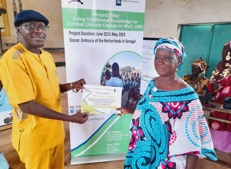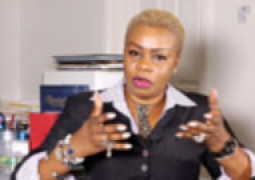
At a 3-day training on climate change communication for 26 traditional communicators – locally called ‘kanyellengs’ in Wuli, Upper River Region (URR), Nfamara Jawneh stressed that his organisation recognised women especially Kanyallengs as critical stakeholders in climate change mitigation.
Beakanyang, a local human rights and environment focused NGO in the country is implementing a project ‘Using traditional knowledge to mitigate climate change in Wuli’. The project, funded by the Netherlands Embassy in Senegal, seeks to raise awareness on climate change.
“Both men and women must participate in the climate change discuss and I’m pleased to note that women in Wuli will never be left behind as it affects all,” he said.
“I’m pleased to report that on our part, since 2013, we have been working with communities across this region to mitigate the effects of climate change. Meanwhile, I would also like to thank the Environment Unit of our Basse Office for the effective coordination of the training,” he said.
According to him, over the years, Beakanyang through its Environment Unit, has established woodlot gardens, provided women with startup capitals to support their small-scale businesses, planted hundreds of trees and raised awareness on the impact of climate on vulnerable communities and would continue to promote local climate actions.
He noted that building the capacities of traditional communicators would help them ensure the dissemination of relevant and timely climate related information in communities
Mr. Jawneh reiterated the organisation’s commitment to working with local communities to combat climate change.
He commended the regional team in Basse and all those who contributed to the success of the training.
Beakanyang boss further encouraged participants to put the skills and knowledge acquired from the training into good use by helping to disseminate and communicate effectively, climate change related happenings in the region and beyond.
“Later this year we will work with some of you in our village sensitisations and we hope you will share what you have learned from the training.”
Speaking at a closing ceremony held at Nyakoi Madina, the lead trainer, Mustapha Sanneh, congratulated the participants for successfully completing the course.
Mr. Sanneh urged them to always serve as effective climate change communicators by putting the new knowledge and theatre skills into good use.
Speaking earlier, Alhagie Bemba Jabby, the alkalo of Taibatou, thanked Beakanyang and partners for working with local communities in the region to combat climate change.
According to him, climate change effects are being felt by all and sundry and thus required concerted efforts by all stakeholders.
“As traditional communicators, you have a very important role to play in setting agenda for local climate actions and I have no doubt you will put the knowledge into good use,” he said.
Mrs. Jawno Kijera of Kerewan, speaking on behalf of the participants, thanked Beakanyang for the training.
She promised that they would serve as good ambassadors in climate change mitigation and would share the knowledge acquired widely in their respective villages.
“We are now well informed about the climate change, its situation in the country and its effects on local communities,” says Jambang Juwara a participant.




